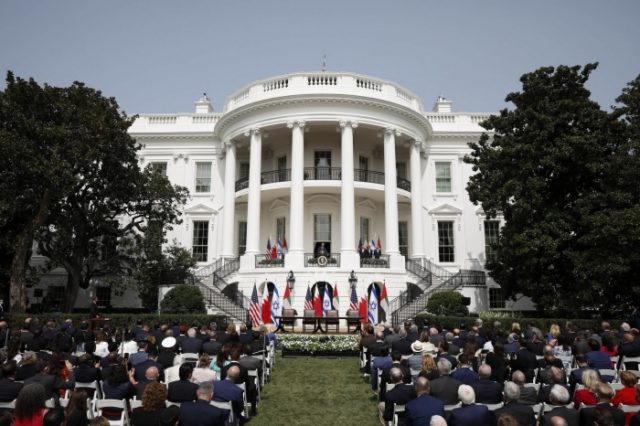Washington, D.C. — The Jewish Policy Center warmly commends the leaders of Israel, the United Emirates, Bahrain, and the United States on today’s signing at the White House of the historic “Abraham Accord.” The agreement establishes formal peaceful relations between Israel, the U.A.E. and Bahrain, endorsed by the United States.
“This pact advances a positive shift in the Middle East that’s been underway for some years,” said JPC Senior Director Shoshana Bryen. “The potential for a broader regional peace has been there since the treaty between Israel and Egypt in 1979. But until recently, Arab, European and even American indulgence allowed rejectionist Palestinian leadership to block it.”
Today’s White House signing by President Trump, Israeli Prime Minister Benjamin Netanyahu, United Arab Emirates’ Foreign Minister Abdullah bin Zayed Al Nahyan and Bahrani Foreign Minister Abdullatif al Zayani formalized a process of Arab states, particularly those in the Persian Gulf most directly threatened by Iran—a declared enemy of Israel as well—putting their own people’s economic, social and security interests ahead of the Palestinian veto, Bryen observed. “They have been able to do so in no small measure due to the Trump administration’s regional peace initiative.”
The Administration’s policies have included, among other things, recognizing Jerusalem as Israel’s capital and moving the U.S. embassy there from Tel Aviv, and underscoring the legality of Jewish settlements in the disputed West Bank (Judea and Samaria)—as well as withdrawing from the 2015 ”Iran deal.”
“The old ‘peace process’ pressured Israel to make potentially dangerous concessions on security and territory to Palestinian leaders who kept insisting Jews had no history in Jerusalem and no rights to a state in any part of what had been Mandatory Palestine,” Bryen said. “So Palestinian terrorism sabotaged the 1993 Oslo Accords, the bloody second intifada followed the offer of a Palestinian state in Gaza and the West Bank in 2000, and Palestinian leaders spurned the even more sweeping 2008 two-state proposal.”
“But the new peace process builds on common Arab-Israeli interests and opportunities for cooperation—in trade, technology, agriculture, security, tourism and more—that Palestinian rejectionism no longer is permitted to block,” Bryen added. “The Jewish Policy Center praises President Trump and the Israeli, Emirati and Bahrani leaders who took today’s historic step, and encourages others in the Middle East, Europe and even the West Bank and Gaza Strip to build upon it.”
Contact: Eric Rozenman, Communications Consultant, 571 276-8652 / erozenman@jewishpolicycenter.org






